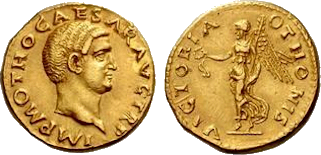April 16, 2016, by Will Leveritt
On this day in AD 69 the Roman emperor, Otho, died by his own hand in Rome
Text by Mike Welbourn
He was born Marcus Salvius Otho at Ferentium (modern-day Ferento) in Etruria on 28 April, 32. His family was one of the leading clans of the town and were apparently descendents of Etruscan royalty. Otho’s father, Lucius, seems to have been a courtier and close ally of both Tiberius and Claudius.

AU aureus of Otho. Observe has bare head of emperor right, IMP M OTHO CAESAR AVG TR P. Reverse has Victoria l., VICTORIA OTHONIS.
The Roman biographer Suetonius tells us that from a young age Otho lived a luxurious and somewhat dissolute life. After his father died he entered Nero’s inner circle and became one of the young emperor’s closest friends – no doubt because of their shared love of extravagance.
By 58 Otho had married the famous Poppaea Sabina. She was by all accounts a renowned beauty and eventually attracted the attention of Nero. It seems that in order to remove Otho as a possible obstacle to their liaison – Nero eventually married Poppaea in 62 – the emperor sent Otho to govern the province of Lusitania (roughly modern-day Portugal) at the remarkably young age of 25 or 26 and despite the fact that Otho was only of quaestorian rank (Lusitania was then a province normally governed by an ex-praetor).
Otho was kept in the province for some ten years (58-68), during which time it is said he proved to be a just and moderate governor, which not unreasonably might not have been expected of such a close confidante of a man like Nero.
Otho was still in charge of the province when Galba moved against the increasingly unpopular Nero and declared himself emperor. Otho was the first governor to back Galba’s move. It seems, however, that this support would in time lead to the resentment which propelled Otho to conspire against Galba.
For as Galba himself became unpopular a number of governors – including Vitellius and Vespasian, the eventual winner of the civil war that developed – declared themselves the new ruler of the empire.
Otho was yet another. In his case the decision to make a bid for the throne was apparently prompted by the fact that Galba, when he was casting about for a man to adopt (and thus designate as his successor), had overlooked Otho. As the first to support Galba’s takeover of the empire, Otho had perhaps expected to be rewarded in this way.
When this did not transpire, he went to the camp of the Praetorian Guard on the outskirts of Rome and by making bold promises persuaded them to accept him as the new emperor. Galba was subsequently cut down by the soldiers in the Forum Romanum. The senate, accepting the fait accompli, bestowed upon Otho the imperial titles and powers. Thus began the brief reign of emperor Otho.
During his time on the throne he attempted to rule in the same vein as he had governed Lusitania, though he also attempted to curry favour with various groups via various rewards: priesthoods, offices, the granting of citizenship, and the restoration of formerly held positions and status.
The main and immediate threat came from Vitellius, who had behind him the formidable legions of the German provinces, as well as the troops in Raetia, Britain, Spain, and Gaul. The provinces of the East as well as those of Moesia, Dalmatia and Pannonia remained loyal to Otho.
Tacitus tells us that the two men exchanged letters declaring that the other could, if he so choose, retire unharmed into private life. Neither man budged. The exchanges grew ugly, involving accusations of debauched living and extravagant practices.
It was clear enough that the situation could only be cleared up by a war and Otho made preparations for a campaign against his rival. Having organized his campaign, Otho left Rome on 14 March, 69, heading north to meet Vitellius’ army. He stationed himself at Brixellum.
After some initial success against Vitellius’ forces, the key engagement took place on 14 April at the Battle of Bedriacum. The battle seems to have been bloody (Cassius Dio claims a death toll of some 40,000 men) but ended in the defeat of Otho’s legions which fled back to their camp at Bedriacum.
When news of the defeat reached Otho at Brixellum, he took what Cassius Dio views as the noble decision to sacrifice himself in order to cut short the civil war and prevent further suffering. His soldiers and friends attempted to dissuade him, but on 16 April 69, at the age of 36, and having reigned for only three months, Otho took his own life.
No comments yet, fill out a comment to be the first

Leave a Reply